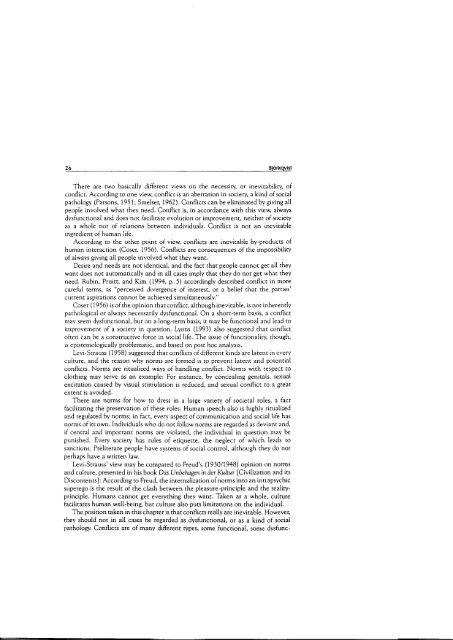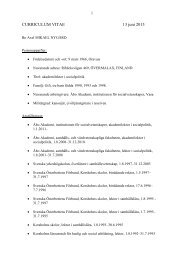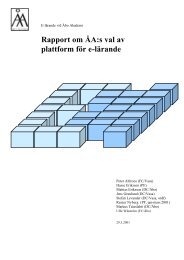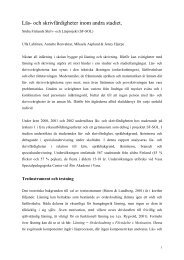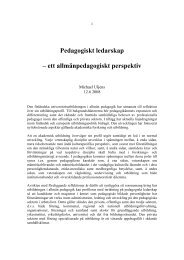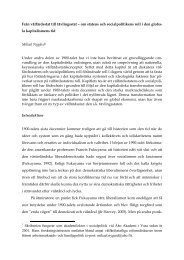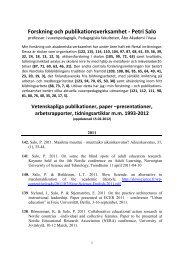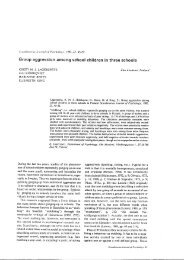Theoretical Considerations on Conflict and Aggression
Theoretical Considerations on Conflict and Aggression
Theoretical Considerations on Conflict and Aggression
Create successful ePaper yourself
Turn your PDF publications into a flip-book with our unique Google optimized e-Paper software.
26 BlorkqvislThere are rwo basically different views <strong>on</strong> rhe necessiry or inevitabiliry, ofc<strong>on</strong>flicr. According ro <strong>on</strong>e view, c<strong>on</strong>flict is an aberrati<strong>on</strong> in sociery a kind of socia[parhology (Pars<strong>on</strong>s, 1951; Smelser, 1962). C<strong>on</strong>flicts can be elinrinated by giving allpeople involved what they need. C<strong>on</strong>flict is, in accordance with this view, alwaysdysfuncti<strong>on</strong>al <strong>and</strong> does not facilitate evoluti<strong>on</strong> or improvement, neicher of socieryas a whole nor of relati<strong>on</strong>s between individuals. C<strong>on</strong>flicr is nor an inevitableingredient of human life.According to the other point of view, c<strong>on</strong>flicts are inevitable by-products ofhuman interacti<strong>on</strong> (Coser, 1956). C<strong>on</strong>flicrs are c<strong>on</strong>sequences of the impossibiliryof always giving all people involved what they want.Desire <strong>and</strong> needs are not identical, <strong>and</strong> rhe facr that people cannot get all rheywanr does not automatically <strong>and</strong> in all cases inrply that they do not get what cheyneed. Rubin, Pruitt, <strong>and</strong> Kim (1994, p. 5) accordingly described c<strong>on</strong>flicr in morecareful terms, as "perceived divergence of incerest, or a belief that rhe parties'current aspirati<strong>on</strong>s cannor be achieved simultaneously."Coser ( 1956) is of the opini<strong>on</strong> rhac c<strong>on</strong>flicr, alrhough inevitable, is not inherentlypathological or always necessarily dysfuncti<strong>on</strong>al. On a short-cerm basis, a c<strong>on</strong>flictnlay seem dysfuncti<strong>on</strong>al, but <strong>on</strong> a l<strong>on</strong>g-term basis, it nray be functi<strong>on</strong>al <strong>and</strong> lead toimprovement of a sociecy in questi<strong>on</strong>. Ly<strong>on</strong>s (1993) also suggested thar c<strong>on</strong>fiictoften can be a c<strong>on</strong>srructive force in social life. The issue offuncti<strong>on</strong>aliry though,is epistenrologically problematic, <strong>and</strong> based <strong>on</strong> post hoc analysis.Levi-Strauss (1958) suggesred char c<strong>on</strong>flicrs ofdifferenr kinds are latent in everyculture, <strong>and</strong> the reas<strong>on</strong> why norms are formed is to prevent latent <strong>and</strong> potentialc<strong>on</strong>flicts. Norms are ritualized ways of h<strong>and</strong>ling c<strong>on</strong>flicr. Nornrs wirh respect toclothing may serve as an example: For instance, by c<strong>on</strong>cealing genitals, sexualexcitati<strong>on</strong> caused by visual srimulati<strong>on</strong> is reduced, <strong>and</strong> sexual c<strong>on</strong>flict ro a greatextent is avoided.There are norms for how to dress in a large variery of societal roles, a factfacilitating the preservati<strong>on</strong> of these roles. Human speech also is highty ritualized<strong>and</strong> regulated by norms; in fact, every aspect of communicati<strong>on</strong> <strong>and</strong> social life hasnorms of its own. Individuals who do not follow nornls are regarded as deviant <strong>and</strong>,if central <strong>and</strong> important norms are violared, rhe individual in questi<strong>on</strong> may bepunished. Every sociery has rules of eciquecte, rhe neglect of which leads tosancti<strong>on</strong>s. Preliterate people have sysrems of social c<strong>on</strong>trol, although they do notperhaps have a wricren law.l-evi-Srrauss' view may be compared to Freud's (19]0/1948) opini<strong>on</strong> <strong>on</strong> norms<strong>and</strong> culture, presented in his book Das lJnbehagen in der Kultur lCivilizati<strong>on</strong> <strong>and</strong> itsDisc<strong>on</strong>tents]: According to Freud, the internalizati<strong>on</strong> of norms into an intrapsychicsuperego is the result ofthe clash between the pleasure-principle <strong>and</strong> the realiryprinciple.Humans cannot get everyching they want. Taken as a whole, culturefacilitates human well-being, but culture also puts limitad<strong>on</strong>s <strong>on</strong> the individual.The positi<strong>on</strong> raken in this chapter is rhat c<strong>on</strong>flicts really are inevirable. However,rhey should not in all cases be regarded as dysfuncti<strong>on</strong>al, or as a kind of socialpathology. C<strong>on</strong>flicts are of many different rypes, some functi<strong>on</strong>al, some dysfunc-


